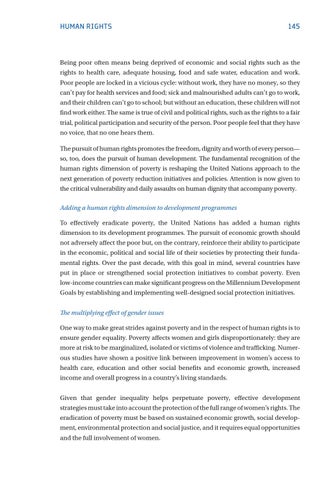HUMAN RIGHTS 145
Being poor often means being deprived of economic and social rights such as the rights to health care, adequate housing, food and safe water, education and work. Poor people are locked in a vicious cycle: without work, they have no money, so they can’t pay for health services and food; sick and malnourished adults can’t go to work, and their children can’t go to school; but without an education, these children will not find work either. The same is true of civil and political rights, such as the rights to a fair trial, political participation and security of the person. Poor people feel that they have no voice, that no one hears them. The pursuit of human rights promotes the freedom, dignity and worth of every person— so, too, does the pursuit of human development. The fundamental recognition of the human rights dimension of poverty is reshaping the United Nations approach to the next generation of poverty reduction initiatives and policies. Attention is now given to the critical vulnerability and daily assaults on human dignity that accompany poverty. Adding a human rights dimension to development programmes To effectively eradicate poverty, the United Nations has added a human rights dimension to its development programmes. The pursuit of economic growth should not adversely affect the poor but, on the contrary, reinforce their ability to participate in the economic, political and social life of their societies by protecting their fundamental rights. Over the past decade, with this goal in mind, several countries have put in place or strengthened social protection initiatives to combat poverty. Even low-income countries can make significant progress on the Millennium Development Goals by establishing and implementing well-designed social protection initiatives. The multiplying effect of gender issues One way to make great strides against poverty and in the respect of human rights is to ensure gender equality. Poverty affects women and girls disproportionately: they are more at risk to be marginalized, isolated or victims of violence and trafficking. Numerous studies have shown a positive link between improvement in women’s access to health care, education and other social benefits and economic growth, increased income and overall progress in a country’s living standards. Given that gender inequality helps perpetuate poverty, effective development strategies must take into account the protection of the full range of women’s rights. The eradication of poverty must be based on sustained economic growth, social development, environmental protection and social justice, and it requires equal opportunities and the full involvement of women.
